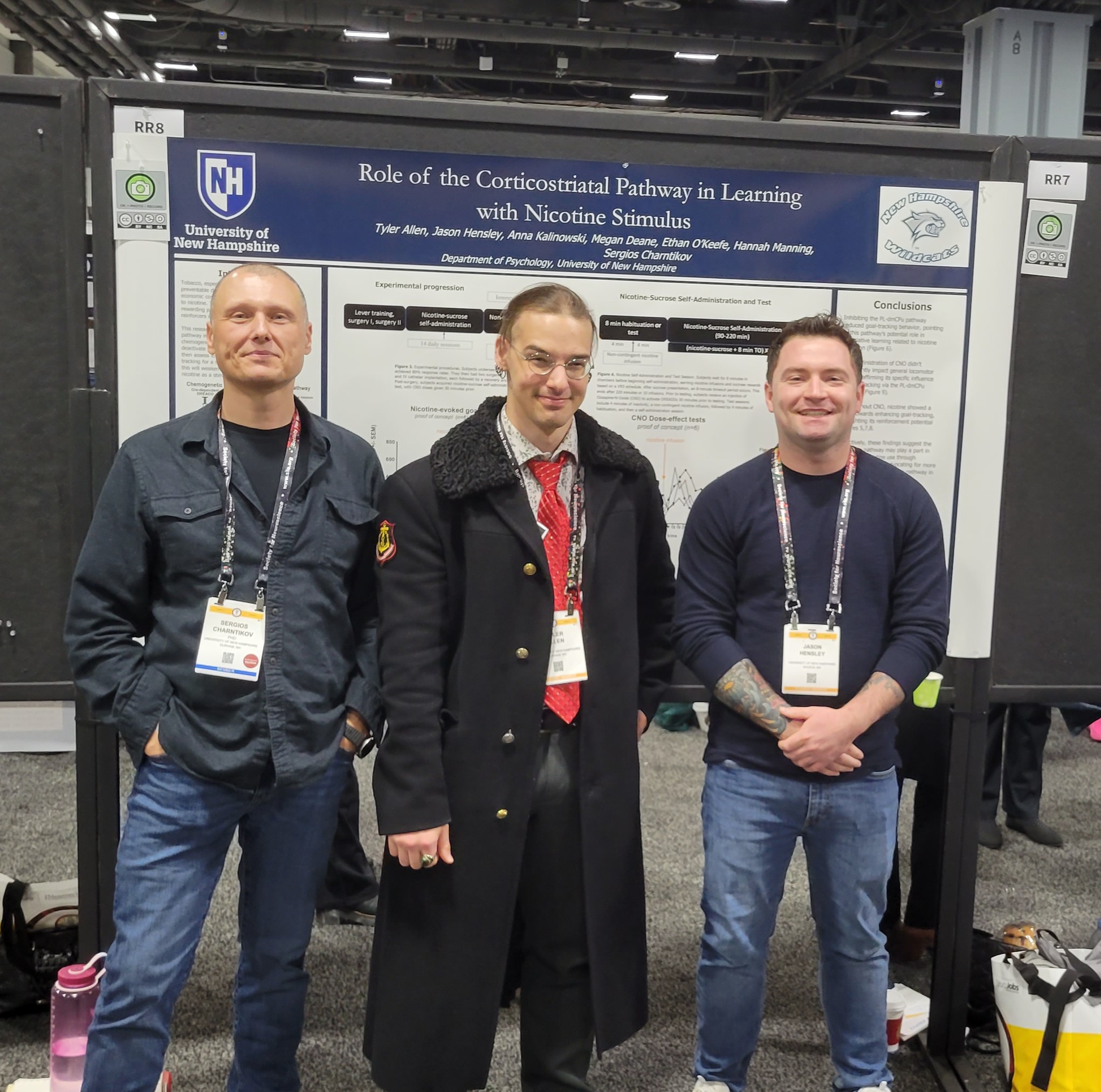
Charntikov NeuroLab
Exploring the Neurobiology of Learning and Individual Variability in Substance Use, led by Sergey Charntikov at the University of New Hampshire.

SFN 2023
Left to right: Sergey Charntikov (PI), Tyler Allen (Doctoral Student), Jason Hensley (Doctoral Student)
Our research program takes a multidisciplinary approach to understanding the neurobiology and behavior associated with substance use disorders. At the forefront of our work is the examination of the variability in substance use and response to interventions. We explore how susceptibility to stress influences the interplay between stress-related disorders and heroin addiction and examine the impact of a person’s history with nicotine or alcohol on their recovery journey. Central to our mission is dissecting the neural mechanisms of associative learning involving drug cues, with a particular focus on nicotine due to its widespread abuse despite being a relatively weak reinforcer. Supported by recent NIH funding, our project investigates the roles of the afferent and efferent connections to the dorsomedial caudate-putamen in nicotine-associated learning processes. Through a targeted chemogenetic approach, we aim to unravel the immediate neural circuitry that underlies associative learning with nicotine as an internal cue. This research has the potential to revolutionize our understanding of the neurobiological underpinnings of nicotine dependence. Utilizing translational preclinical models of drug self-administration and advanced behavioral economics, our research seeks to map the individual pathways of substance use disorders. We combine these models with sophisticated analytical methods to tailor treatment strategies to the unique behavioral and biological profiles of individuals. Our ultimate goal is to develop personalized therapies that account for each person’s substance use history. By delving into the complex dimensions of substance use disorders, we are dedicated to advancing treatment and prevention strategies that address the nuanced needs of affected individuals.
news
| Feb 7, 2025 | We are excited to announce that our latest research has been published in the International Journal of Molecular Sciences! 🎉 Our study, “Gene Expression Changes Following Long-Access Methamphetamine Self-Administration in a Rodent Model”, investigates how methamphetamine (METH) alters neurobiological and cognitive functions in the prefrontal cortex (PFC) and hippocampus. Using RNA sequencing (RNA-Seq), we identified differentially expressed genes (DEGs) involved in synaptic plasticity, immune response, and energy metabolism. Key findings include:
📅 Published: February 7, 2025 📖 Special Issue: Biochemical and Molecular Changes in the Brain Caused by Drug Abuse: Implications for Therapeutic Intervention Authors: Kristopher L. Robison¹, Victoria Madore¹, Nicole Cova¹, Mona Karbalivand², Sherine F. Elsawa², and Sergios Charntikov¹ ¹Department of Psychology, University of New Hampshire, Durham, NH, USA ²Molecular, Cellular, and Biomedical Sciences, University of New Hampshire, Durham, NH, USA Stay tuned for more insights from our research! |
|---|---|
| Jan 25, 2024 | We are looking for talented research assistants and graduate students! Please reach out for more information. |
| Sep 10, 2023 | We are thrilled to share that our lab has been awarded funding from the National Institutes of Health (NIH) to explore the neurobiology of learning influenced by nicotine stimuli. This significant achievement enables us to delve deeper into understanding the intricate mechanisms of addiction and cognitive processes. Stay tuned for exciting developments and insights from our research journey! |
latest posts
selected publications
- Differential Gene Expression in the Prefrontal Cortex and Hippocampus Following Long-Access Methamphetamine Self-Administration in Male RatsInternational Journal of Molecular Sciences, Jan 2025Number: 4 Publisher: Multidisciplinary Digital Publishing Institute
- Varenicline rescues nicotine-induced decrease in motivation for sucrose reinforcement.Behavioural Brain Research, Jan 2021
- Inactivation of posterior but not anterior dorsomedial caudate-putamen impedes learning with self-administered nicotine stimulus in male ratsBehavioural Brain Research, Sep 2021
- Individual Vulnerability to Stress Is Associated With Increased Demand for Intravenous Heroin Self-administration in Rats.Frontiers in Behavioral Neuroscience, Jun 2019
- Assessment of individual differences in response to acute bupropion or varenicline treatment using a long-access nicotine self-administration model and behavioral economics in female ratsBehavioural Brain Research, Jun 2020Publisher: Elsevier
- Assessment of ethanol and nicotine interactions using a reinforcer demand modeling with grouped and individual levels of analyses in a long-access self-administration model using male ratsFrontiers in Behavioral Neuroscience, Jun 2023